Best Hiking Shoes for Women That Protect Your Feet Mile After Mile
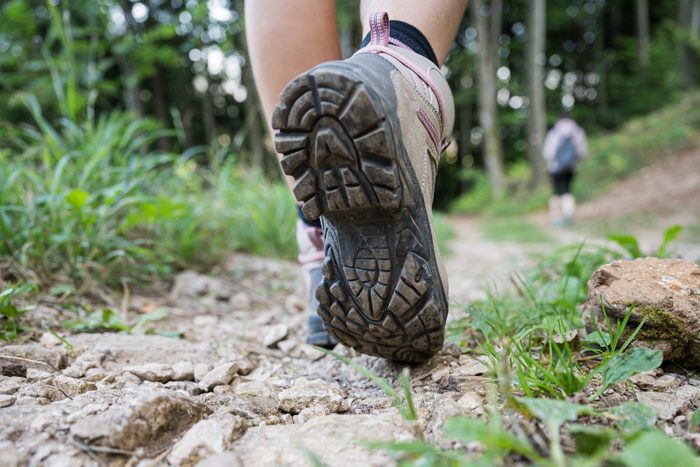
We reached out to podiatrists to find out how to pick the right hiking shoe for you. Here are the best recommended hiking shoes for women.
Hiking is a fun, exciting, and mostly free way to get some exercise. Some people even plan whole trips focused on hiking famous trails. Hiking is popular because it’s good for you—mentally and physically. A report from 2018 in the American Journal of Lifestyle Medicine found that hiking may benefit health by providing people with access to natural elements like daylight and fresh air. Some of the great benefits of nature. The researchers also noted that hiking is a low-cost form of physical activity that may also promote physical and emotional health restoration. The same report also found that people tend to burn more calories hiking than from other types of exercise like walking or running because they naturally spent more time engaging in physical activity than they would if they exercised somewhere else like a gym.
Many hikers also say hiking feels more fun and less like working out, which may encourage them to push themselves harder or longer than they would otherwise. With hiking trails popping up everywhere, from major metropolitan sites to suburbs, it’s becoming easier and easier to go for a hike. But there’s one very important consideration to make before planning your first hike: your choice of footwear. If you’re hiking a short distance on even or level terrain, a good pair of sneakers or walking shoes may fill the bill. If you’re planning on more strenuous hiking or hiking on steep or uneven ground, you really need to get a good-quality hiking shoe or boot.
Here’s what the experts have to say about how to purchase the right hiking shoes for women. They share what to look for and other considerations when hunting for the perfect hiking shoe to keep your feet happy and healthy while you hike.
(Related: 7 Shoe Mistakes You’re Making That Hurt Your Feet)
Considerations when buying hiking shoes for women
Feet come in all different shapes and sizes, so the right hiking shoe for you may not work for other people. Still, here are some of the top things podiatrists recommend considering when purchasing hiking shoes.
Size
It may seem obvious, but finding the right size of hiking shoes for your feet is one of the most important considerations when looking for the best hiking shoe to avoid pain. Most hiking stores or shoe stores have tools called a Brannock Device that can measure the length and width of your feet so that you know what to look for. A foot specialist like a podiatrist can also accurately measure the length and width of your foot. Knowing the exact length and width of your feet is key because sizing standards can vary, sometimes drastically, between brands and styles.
Always try on a shoe, walk around a bit in it before purchasing it, and never purchase shoes that feel too big or too small. In other words, if a shoe doesn’t initially fit, don’t buy them assuming they will stretch out or shrink over time. Podiatrists like Lauren Wurster, DPM, board-qualified ankle and foot surgeon with the American Board of Foot and Ankle Surgery, also suggest trying on hiking shoes later in the day to get the proper fit. Later in the day, most people’s feet are a bit more swollen so you’ll get a better gauge of whether the hiking shoes really fit.
(Related: The 10 Best Hikes in Canada)
Material
The best type of material for hiking shoes depends a lot on what type of hiking you want to do. In the summer or warmer months, it’s usually a good idea to pick materials that breathe, like mesh or natural fabrics. In colder months or when hiking in water, wet weather, or snow, try to pick hiking shoes made with thick materials like leather or waterproof materials to keep the elements out and your feet warm and dry.
Colin O’Connor, senior podiatrist at Mod Pod Sport & Family Podiatry in Sydney, Australia, says many hiking shoes come with a waterproof lining made of materials like GORE-TEX.
People hiking in areas with rough terrain or natural elements that could damage the feet, like sharp rocks or tree branches, may also want to pick hiking shoes with thick, durable fabrics.
Sole
The experts say the sole, or base, of the shoe can greatly impact how well your foot is supported. “Is the sole of the shoe stiff or flexible? Is it thick or thin?” says Dr. Wurster. “A thick, stiff sole of a shoe is beneficial for overall support of your foot, as well as protection from the outside elements.”
Bruce Pinker, a podiatrist and board-certified foot and ankle surgeon by the American Board of Podiatric Medicine with Progressive Foot Care in New York says look for hiking shoes with shock-absorbing materials in the sole or parts of the sole like rubber or ethylene-vinyl acetate (EVA).
Arch support
Most good hiking shoes have arch support, but not everyone may need it. “Arch support is important for some women who hike, especially those with a low arch. Those with a normal arch do not require extra support in this area,” says Dr. Pinker. He adds that arch support is usually built into the inner side of the foot bed of shoes in the mid-foot region and is often composed of either rubber or EVA.
(Related: How to Find Summer Sandals That Won’t Wreck Your Feet)
Ankle cuff
The experts say many good hiking shoes have a lower ankle cuff, the place where the shoe ends near the ankle, like regular running or walking shoes. Having a lower ankle-cuff increases flexibility and airflow around the ankles. Hiking shoes with a lower ankle cuff also reduce the risk of blistering while wearing in new shoes because the ankles don’t rub against the shoe. But if you need more ankle stability or are hiking on uneven terrain, Dr. Wurster recommends picking a hiking shoe with a high ankle cuff. If your ankles may get damaged by natural elements like sharp sticks, rocks, or bushes, a hiking shoe with a higher ankle cuff may also be the safest option.
Grip
If you’re hiking on uneven, rocky, slippery, or rugged terrain, the experts suggest hiking shoes with a good grip on the bottom. “Added traction on outer soles is important for better grip while hiking,” says Dr. Pinker. Hiking shoes with good grip often have soles with spikes, nubs, bumps, or heavily textured soles.
Toe box and cap
According to the experts, most people overlook one important feature of hiking shoes—the toe box. A toe box is the space at the front of the shoe where the toes fit. “A square, wide, and deep toe box in hiking shoes goes a long way when you have foot problems,” says Dr. Wurster. To find a shoe with a good fitting toe box, she suggests ensuring there’s enough space to wiggle your toes freely.
Dr. Wurster and Dr. Pinker add that a toe cap, or extra protection (usually thick rubber) around the toe area may be helpful when hiking in places the toes could get crushed, such as rocky or rough terrain.
Medical conditions
The experts say it’s important to decide whether a hiking shoe will accommodate for certain medical conditions if you have them. For example, does the shoe offer ample space in the toe area if you have hammertoes? Dr. Pinker says some hiking shoes offer deeper than normal heel cups, which can assist with heel pain conditions such as plantar fasciitis and heel spurs.
Dr. O’Connor says that, unfortunately, no hiking shoe or hiking company considers bunions or other medical issues as there are way too many foot shapes and sizes. He says if you have a pre-existing foot condition, you may need to have custom orthotics made for you by a medical professional or use over-the-counter insoles for a more custom fit, which can help weight distribution and help to stabilize the ankles and feet.
Comfort elements
Many hiking shoes for women now come with added comfort elements like gel or memory foam patches that helps absorb shock and lessen the impact on your feet. But it may not always be the best idea to let these extra bells and whistles factor too heavily in your decision.
Dr. Wurster says memory foam and gel can both break down over time. She suggests it’s more important to pick a hiking shoe that feels like a good fit on your feet than one with features that may not last the life of the shoe.
Brand
The experts agree that brands that are specially designed exclusively for hiking tend to make the best hiking shoes, as opposed to companies better known for running or walking shoes.
(Related: The Awesome Health Benefits of Awe Walking)
The best hiking shoes for women
Keeping track of all of the different features and considerations to look for when getting women’s hiking shoes can be tricky. To make things easier, here are some of the best women’s hiking shoes based on advice from the experts.
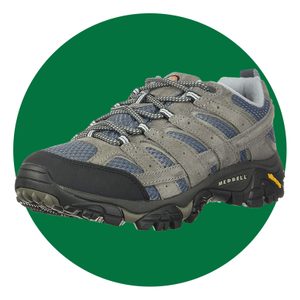
Merrell Women’s Moab 2 Vent Hiking Shoe
There’s a reason this hiking shoe from Merrell is called the “mother of all boots” or moab, the hiking shoe is the number one seller in the hiking shoes for women category on Amazon. The Moab 2 vent hiking shoe features durable, breathable materials like suede and leather with breathable mesh patches dispersed throughout the shoe. It also comes with an extremely durable, slip-resistant, stabilizing sole and air-cushioning in the heel of the foot bed for extra cushioning while you hike.
As a bonus for the environment, the Moab 2 vent hiking shoe is also made of recycled materials and light-weight, weighing just 12 ounces. Even better, this shoe offers a protective toe cap for extra safety.
$135, mec.ca.
(Related: Is Walking Good Exercise? Everything You Need to Know About Walking for Exercise)
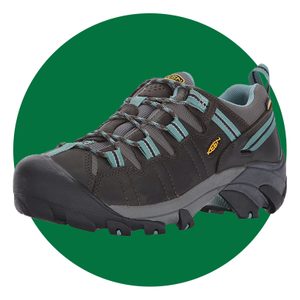
KEEN Women’s Targhee 2 Low Height Waterproof Hiking Shoe
This shoe from KEEN provides exceptional traction with its deep rubber sole grips that helps hikers keep their grip in difficult terrain like muddy environments, slippery surfaces, and rocky surfaces. It also features a mesh lining that helps keep your feet cool even in warmer weather.
This shoe is also waterproof and has a breathable membrane that allows water vapor out without letting water inside. If you need extra arch support, this shoe also contains a non-removable EVA arch support built-in. This shoe also contains extra comfort features, like a cushioned collar to reduce the risk of pain and discomfort around the ankle. It even includes a thick toe cap for extra safety.
$125, sportchek.ca.
(Related: The Best Walking Workout for Older People)
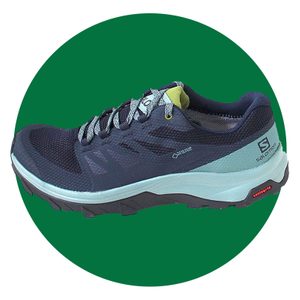
Salomon Women’s OUTline GTX W Hiking Shoes
This shoe is unique to the list in that it has the flexibility and weight of a regular running shoe with the stability and grip of a hiking shoe. Coming in at 10.23 ounces, this option from Salomon is the lightest option in this list and amongst many styles and brands.
This shoe also offers comfort normally found in a flexible running shoe, unlike many hiking shoes that have more rigid structure and style. It also offers extra protection containing a toe cap and is waterproof.
$160, sportchek.ca.
(Related: Walking This Number of Minutes Will Boost Your Mood)
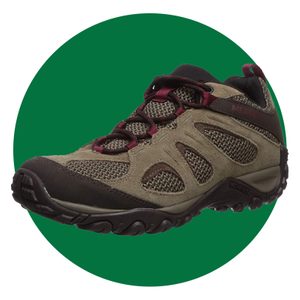
Merrell Women’s Yokota 2 Hiking Shoe
If most Merrell shoes fit you, this may be a good option for you. Their design is more like an amped-up sneaker or running shoe, offering a lot of flexibility and comfort.
Like many hiking shoes, they offer durability and breathability thanks to a mixture of suede and mesh material. This shoe also has a grippy rubber sole with deep grooves to provide extra grip.
$109, mec.ca.
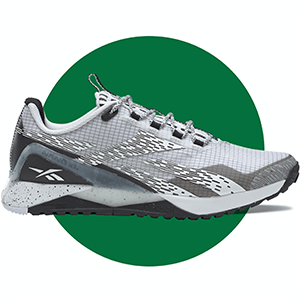
Bonus pick: Reebok’s Nano X1 Adventure sneakers
These training shoes are not exactly a hiking boot, but are perfect for those of us who explored outdoor workouts during the pandemic. Reebok reimagined their classic trainer, adding features like a rubber lug sole for enhanced traction on a variety of surfaces, while still keeping these sneakers lightweight.
The Nano X1 Adventure sneakers are available in both mens and women’s sizes and three different colour options.
$150, Reebok.ca.
Next: The 8 Best Winter Boots For Your Feet, According to Podiatrists




